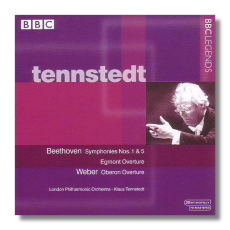
The Internet's Premier Classical Music Source
Related Links
- Beethoven Reviews
- Latest Reviews
- More Reviews
-
By Composer
-
Collections
DVD & Blu-ray
Books
Concert Reviews
Articles/Interviews
Software
Audio
Search Amazon
Recommended Links
Site News
 CD Review
CD Review
Ludwig van Beethoven

- Ludwig van Beethoven:
- Symphony #1 in C Major, Op. 21
- Symphony #5 in C minor, Op. 67
- Egmont Overture, Op. 84
- Carl Maria von Weber: Oberon Overture, J 306
London Philharmonic Orchestra/Klaus Tennstedt
BBC Legends BBCL4158-2 80m ADD
Let me say it straight away; apart from its historical value, this disc is an absolutely unforgettable experience. You do not just listen; you become part of the music itself, transcending all that is human and getting enmeshed in all that is infinitely divine. If you do not believe in God, after these Tennstedt interpretations, then I am sure you will.
The Maestro was always constantly seeking that great expressive intensity that would give his readings that all encompassing greatness which we call immortality. And this, even more so after he became seriously ill in 1987 when he collapsed during a rehearsal with the London Philharmonic.
These live recordings were taped in 1989 (Symphony #1), 1990 (Oberon Overture and Symphony #5) and 1991 (Egmont Overture) and I have absolutely no qualms about their high level of recording. In fact they sound much better than most digital studio recordings of today, apart from audience intrusions that is. The Oberon Overture seems to have been a favourite with Tennstedt as it featured regularly in his concerts. This 1990 Proms account has a gentle and highly poetic opening which reminded me of a soft breeze rustling among the first trees, and then everything comes to life in the sprightly and springy allegro. Sadly this was also the very last work that Tennstedt conducted in June 1994 before his demise in January 1998.
Beethoven's First Symphony is, I feel, a rather dramatic account of a work bubbling with youthful bliss. Although the intensity that Tennstedt displays in the composer's Fifth is kept in check, the tension is never allowed to abate. In the third movement, Tennstedt found a certain sense of formal rhythm that is in perfect balance with the drive and impetus that he generates in the fourth. Although at times Tennstedt seems to be in danger of overstepping the symphonic limits of its ebullience, he still manages to maintain a balance between the timbre of his interpretation and the natural essence of the music.
In the Fifth, Tennstedt is both epic and heroic. Although his hallmarks of drive and discipline are still evident, the dynamics are taken to new extremes, thus allowing himself to become completely immersed in this music of overwhelming power. In exploring the romantic character of this piece, Tennstedt applies a kind of energy that grips the listener throughout; even, if I dare say, instilling in him a strong regenerative feeling. In the music's strong sense of victory over adversity, I could also sense Tennstedt's tenacious struggle against illness.
In the 'Egmont' Overture, the Maestro manages to avoid all the theatrical pitfalls that a showy conductor can fall into, giving us a truly noble and defiant reading getting right to the heart of the Goethe tragedy which attempts to create a sense of victory over tyranny and oppression at a personal cost. Although Goethe's message may seem to be a matter of life and death, in Tennstedt's hands this is transformed into triumph over death.
This is a disc to cherish as a treasure to the wonderful legacy of Klaus Tennstedt. In his lifetime he was slightly underrated but this document is ample proof of his outstanding musicality and great personal integrity.
Copyright © 2005, Gerald Fenech




















